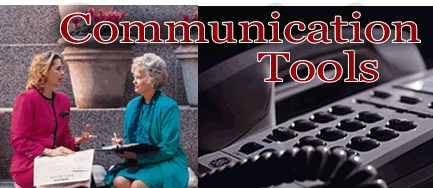
It seems that we are continuously inundated with technological devices designed to help us with communication. Telephones, fax machines, email, newspapers, pagers, instant messaging, radio, wireless phones, voice messaging, amplifiers, satellite, text messaging, blogging, television, and hundreds more, all promise to communicate our messages more quickly and easily. New social networking sites such as Facebook and Twitter, help to keep us connected wherever we go.
Yet, with all of this technology, our interpersonal communication skills seem a little lacking. In fact, because we tend to be so focused on the technology of communication, and the words that we use, we sometimes forget to develop the powerful personal communication tools that we were born with: our eyes, ears, voice inflection, body language, and gestures. Experts tell us that only 15% of communication is contained in the words that we use. 85% of the meaning, therefore, comes from our tone, manner, posture, eye movement, gestures and inflection. Here are some tips:
Use your eyes. I personally believe that the eyes are the most important communication tool we have. It has been said that the eye is the window to the soul. And this is nowhere more apparent then in personal communication. Try this: give someone instructions while they are staring at a computer screen. See how much they get. Then, have them look you in the eye while you give the same instructions. You will be amazed at the difference. The words are the same, but the eye contact makes the communication flow. When you listen, listen with your eyes, not just your ears. When you speak, let your eyes reflect your message and notice how much more effective you become.
Use your ears. Listen. That is one of the great keys to communication. Many people focus so much on what they are going to say, they forget to actually participate in the conversation. You have two ears and only one mouth. This is a subliminal message to you to listen twice a much as you talk. Listen with your ears, listen with your eyes, listen with your whole body. This tells others that you care about what they are saying–that you want to communicate, not just talk them. I recently asked a group of young people why they prefer texting instead of calling someone on the phone or meeting them in person. They said, “then I’d have to listen to them.” Effective listening is a rare skill that, properly developed, will set you apart from the crowd as a great communicator.
Use your body. Our posture and gestures communicate volumes about our attitude toward what is being communicated. If you sit up, lean forward, and gesture with your hands, it’s pretty easy to tell that you are involved and excited about that is being communicated. On the other hand, if you slouch, fidget, put your hands in your pockets, or look around during the communication, the message is equally obvious.
Use your voice. We all know that the tone of our voice can cast entirely different meanings on words. The simple word hello can mean “welcome,” “what do you want,” “nice to meet you,” or “don’t bother me”–depending on the tone of voice that you use. Learn to smile with your voice. You do this by smiling with your mouth. Animate your language by placing emphasis and enthusiasm on important words. Whether in person or on the phone, you can use your voice to make your communication more effective.

Leave a Comment